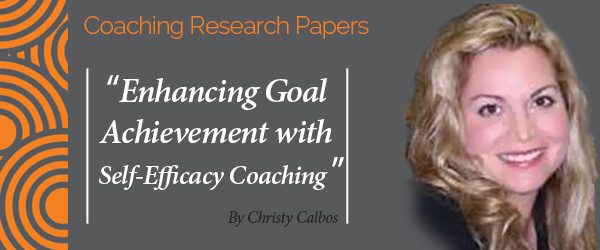Research Paper By Christy Calbos
(Small Business, Attorney, and Wellness Coaching, UNITED STATES)
Introduction
Happiness does not come in large incomes or the most exotic home, it comes in small doses of a great self esteem which can be built upon the strengths of an individual.
Nicholas A. McGirr
To set goals in motion is monumental for most humans. So often doubts about our abilities to accomplish those goals will creep in because we are remembering past failures. Often clients will think (aloud or silently),
I’m fed up (or inspired!). I definitely want this thing (insert the goal/dream)….but I truthfully don’t believe that I can/will have it. I don’t believe that I’m strong enough or disciplined enough to do this.
When the coach inquires about the foundation for the client’s disbelief and doubt, the client may refer back to past failures and cite those examples as “proof positive” that he or she is lacking in the “required traits” or criteria that are needed to accomplish the current goal.
This paper undertakes an examination of the intersection between positive psychology (focus on strengths) with self-efficacy (perception of ability to be efficient) and enactive attainment (proof of past accomplishments). When faced with doubts about current abilities to conquer a task, the coach can help clients see all three aspects as forming a triangle of reliability. The client can self-inquire,
Would my beliefs (and therefore actions) in furtherance of the goal be positively impacted if I assumed that I DID have the necessary strengths to complete this? And to validate those beliefs, what if I looked back in time to other situations where those strengths served me well enough to execute notable achievements?
As the goal is set in place and the client reveals self-doubt, coaches may choose to begin with a series of questions to ascertain the beliefs and world views of the client, as well as self-perceptions:
As we approach these questions with coaching clients, the fundamental issue is whether or not a client undertakes a goal or self-improvement plan with the idea that they are doomed to fail or destined to succeed. Much of this depends upon how the client perceives the “tools” that are in their kit. These tools are often psychological measuring sticks of their own perceived abilities, traits, habits, and characteristics. As we know, perception does not always match reality. Clients tend to be much stronger, more resilient, and resourceful than they give themselves credit for (and remember being, in the past).
Positive psychology explores the strengths of the client. It asks the client to focus and work from the individual toolbox of strengths. With careful questioning, the coach can reposition the client to understand (remember) that they have been successful at a huge number of other tasks. The objective in coaching is to guide the client to gradually accept the premise:
The goal WILL be accomplished. It does not matter that I have tried before without success to undertake other accomplishments. I have done many things well. And I am focusing upon what I have done properly and can do properly. I have what it takes. My strengths are now transferable into the new goal and current moment.
Another perspective shift utilizing an element of positive psychology is for the coach to ask the client:
I’d like you to assume success is inevitable and work backwards from there. If you are destined to succeed, if it is definitely going to happen that you will accomplish this goal, what will you be doing, thinking, feeling, and portraying from this moment until the moment of accomplishment?
This type of hypothetical often permits the client to suspend their self-perception as ‘limited’ or ‘lacking’ and step into the role of achiever/accomplisher.
Positive Psychology: A Brief Overview
What is Positive Psychology? Rather than focusing on what is wrong or dysfunctional, positive psychology is the scientific study of the strengths and virtues that enable individuals and communities to thrive. The field is founded on the belief that people want to lead meaningful and fulfilling lives, to cultivate what is best within themselves, and to enhance their experiences of love, work, and play.
